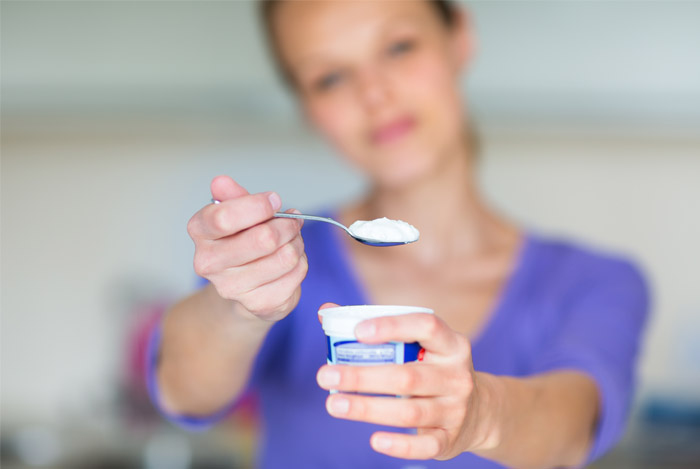Remember searching through your grandmother’s fridge, hoping to find a snack, only to find a carton of yogurt?
At the time, you may have been disappointed it wasn’t pudding or ice cream. But it still seemed like enough of a snack to warrant eating, so you begrudgingly tore off the little foil cover and ate it up.
What you didn’t realize as you ate the creamy, surprisingly tasty treat was how well you were treating your body.
That’s why, when you go to the supermarket as an adult, you’re practically overwhelmed with a whole sea of brands in bright, happy colors that are slowly taking over the dairy aisle.
And while you might still think of yogurt as nothing more than a standard find in your grandmother’s refrigerator, it’s actually a food you’d be smart to include in your fridge as well.
The nutritional value of yogurt has always been somewhat known, but not to the extent of what’s understood today. Now that science is finally getting around to figuring out how yogurt actually works to help the body, its full benefits are being revealed.
So, let’s pull out our spoons and get the scoop on what makes yogurt good for your health.
What is Yogurt?
 Yogurt is a form of curdled milk, most often from cows (but sometimes from goats or even buffalo), that is fermented by the naturally occurring bacteria inside of it. As it coagulates, or thickens, it becomes creamy and has a slightly tangy flavor. The way it’s made is similar to that of sour cream, but with far less fat.
Yogurt is a form of curdled milk, most often from cows (but sometimes from goats or even buffalo), that is fermented by the naturally occurring bacteria inside of it. As it coagulates, or thickens, it becomes creamy and has a slightly tangy flavor. The way it’s made is similar to that of sour cream, but with far less fat.
Commercially produced yogurt often has bacteria added to aid in the fermentation process, as well as flavorings and colorings, or the addition of various fruit.
There exists a variety of yogurts in just about every supermarket. Regular yogurt comes in nonfat or low-fat, and in a huge range of flavors and textures.
Greek yogurt, an easier option for those of us with mild lactose intolerance, has been on a huge upsurge in popularity in the past decade or so. In some ways, Greek yogurt is the healthier option, but be wary of its much higher saturated fat content.
Full of Vitamins and Nutrients
 Yogurt has indeed long been known as a healthy snack, and for good reason.
Yogurt has indeed long been known as a healthy snack, and for good reason.
An eight ounce serving of yogurt is seriously packed with healthy vitamins and nutrients.
Every spoonful contains vitamin A, vitamin D, many of the B complex vitamins including thiamin, riboflavin, pyridoxine, pantothenic acid, B12, folate, and choline.
In yogurt, your body will also find and appreciate a strong supply of calcium, phosphorous, zinc, magnesium, potassium, and selenium.
Yogurt is also packed with protein. That same eight ounce serving of low-fat yogurt contains around 9 grams of protein. If you opt for Greek yogurt, you’ll be getting nearly twice that amount of protein.
Good for the Gut
 For quite a while now the idea of “good” bacteria has been gaining traction in the scientific community. And most of that bacteria is found in the gastrointestinal tract, where their purpose has long been mysterious.
For quite a while now the idea of “good” bacteria has been gaining traction in the scientific community. And most of that bacteria is found in the gastrointestinal tract, where their purpose has long been mysterious.
These bacteria are now known to aid in digestion, produce and more adequately process vitamins, and even protect us from harmful pathogens.
Yogurt is known as a “live” food because of all the microscopic bacteria active inside every serving. Those bacteria known to be good for the health are called probiotics.
Good bacteria most commonly referred to as probiotics are lactic acid bacteria, with crazy names like lactobacillus and bifidobacterium.
Not all yogurts contain these active, beneficial bacteria, so the National Yogurt Association created a “Live Active Culture” seal for yogurt packaging, to help indicate a certain level of lactic acid bacteria.
The popular yogurt brand Activia has even trademarked their own probiotic culture called bifidus regularis, which they claim has special benefit to the digestive tract.
There are over a thousand known species of bacteria in the gut, all battling it out to determine whether you’re in good health or bad. And they don’t only regulate your digestive system; gut bacteria can also help your body respond better to allergens, fight off disease, and regulate weight.
Immune Support
 Roberta Lee, medical director at the Continuum Center for Health and Healing, says she is convinced probiotics are beneficial for immune health.
Roberta Lee, medical director at the Continuum Center for Health and Healing, says she is convinced probiotics are beneficial for immune health.
“Seventy percent of our immune response is directed toward catching foreign invaders introduced through our guts”, she says. Because the probiotics in yogurts have been so well-documented and thoroughly discussed, she continued: “I would be happy to recommend yogurt to a patient”.
A study from the University of Vienna in Austria found that a daily serving of yogurt was just as effective in boosting your immune system as popping pills. 181 factory employees were observed and given either a daily supplement of the probiotic lactobacillus, or a placebo.
Those who took the probiotic took 33 percent fewer sick days than those given a placebo. So if you want to be more effective at work (don’t we all?), and sick less of the time overall, look for yogurts with that “Live Active Culture” labeling.
If you’re aging and worrying about your immune health, yogurt might be the answer. A study published in the American Journal of Clinical Nutrition found the effectiveness of the probiotic bifidobacterium by measuring its efficacy as a dietary supplement for elderly patients.
They concluded that the supplement, found in yogurt, “could be an effective probiotic dietary supplement for enhancing some aspects of cellular immunity in the elderly”.
Children also stand to benefit from the probiotics found in yogurt. A randomized, double blind, placebo controlled study over seven months observing 18 day care centers in Finland sought to measure the number of days children were absent due to respiratory or gastrointestinal symptoms.
Researchers in the study found that children taking Lactobacillus had reduced symptoms and occurrences of respiratory infections, along with fewer days of absence due to illness.
Sounds like probiotics have health benefits across the board, and as yogurt is such a perfect source, you now know exactly where to find them.
Feel Fuller And Lose Weight
 Not only is yogurt delicious and full of nutrients – it may fill you up better than other snacks, making you less hungry throughout the day.
Not only is yogurt delicious and full of nutrients – it may fill you up better than other snacks, making you less hungry throughout the day.
The University of Washington in Seattle performed a study measuring hunger, fullness, and calories consumed in 32 people, half male and female. Each subject consumed a 200 calorie snack.
The snacks were either yogurt with fruit, plain yogurt, a peach-flavored dairy beverage, or peach juice. The results showed that the people who ate the two types of yogurt snack were less hungry and felt fuller than their counterparts.
Researchers in Spain report that they’ve actually concocted a new kind of yogurt to help in weight loss. Because their yogurt is much higher in protein, it provides a much stronger feeling of satiety, said the scientists on the research team.
The probiotics in yogurt also help to create an environment in your gut that can be conducive to weight loss.
“Probiotics are ‘beneficial bacteria’ that promote a healthy gut environment and obstruct the growth of ‘bad bacteria’”, says Rania Batayneh, M.P.H., author of The One One One Diet, writing in the Journal of the American College of Nutrition.
“Various studies show they help lower chronic inflammation”, Batayneh continues, “improve insulin sensitivity in both diabetic and healthy individuals, and lower cortisol levels, which are key players in belly fat”.
So if you want a light snack that can give you a decent energy boost while making you feel as though you’ve eaten even more (and less likely to have those frustrating cravings later), try yogurt.
Bone Health
 According to the National Osteoporosis Foundation, the most important nutrients for reducing your chance of developing osteoporosis, a bone weakening disease, is to consume adequate levels of calcium and vitamin D.
According to the National Osteoporosis Foundation, the most important nutrients for reducing your chance of developing osteoporosis, a bone weakening disease, is to consume adequate levels of calcium and vitamin D.
Each serving of yogurt contains 415 milligrams of calcium, a 42 percent daily value. A serving of milk only has 293 milligrams of calcium. Looks like yogurt is a better source than milk. And, since most authorities recommend 2 to 3 servings of a dairy product every day to reach your calcium goals, yogurt may be the best choice around.
Vitamin D is crucial to the way the body handles and uses calcium. Yogurt can be fortified with vitamin D, so check the labels to see if your favorite yogurt contains plenty of the vitamin most known for building strong bones.
Heart Health
 Every day, most Americans consume way more salt than is recommended for their diets.
Every day, most Americans consume way more salt than is recommended for their diets.
Time reported on a Centers for Disease Control and Prevention (CDC) study revealing that the daily average consumption of sodium was 3,592 milligrams. That’s way higher than the recommended 2,300 milligrams set by the U.S. Department of Health and Human Services (HHS) guidelines.
The potassium in yogurt may help flush some of this excess sodium from the body. The average serving of yogurt, eight ounces, contains almost 600 milligrams. A study by the American Journal of Clinical Nutrition found that adults who ate the most low-fat dairy were 54 percent less likely to develop high blood pressure than those who ate the least.
The probiotics in yogurt may also play a role in lowering blood pressure and promoting heart health.
Researchers have found that these micro-organisms help lower cholesterol, which contributes to less fatty build-up in the blood vessels (one of the main causes of hypertension).
They also control blood sugar and keep the enzymes and proteins responsible for proper blood flow and fluid volumes functioning properly.
In other words, a regular intake of yogurt, thanks to its probiotics and nutrient benefits, may be super beneficial for your heart health.
Yogurt is Good For You
 If you already consume yogurt, there’s evidence you likely have a well-balanced and healthy diet to begin with, as you’re probably inclined towards caring about your nutrition.
If you already consume yogurt, there’s evidence you likely have a well-balanced and healthy diet to begin with, as you’re probably inclined towards caring about your nutrition.
A study published in Nutrition Research found that people who ate yogurt every week had better overall diets and health. And because of the addition of yogurt, they were benefiting even more.
“But even after accounting for the healthier diets of yogurt consumers”, says Paul Jacques, D.Sc., director of the Nutritional Epidemiology Laboratory at Tufts University, “we found that eating yogurt itself leads to a healthier diet because it supplies three nutrients that many Americans don’t get enough of: potassium, calcium, and vitamin B12”.
So there you have it. Yogurt has convincingly presented an argument as to why you should include it in your diet. And regardless of whether you prefer Greek yogurt or the regular kind, you’ll still be receiving comparable nutrient benefits, as well as all of the same probiotics.
Keep in mind that some of those low-fat yogurts have loads of sugar added to them for flavor. As high amounts of sugar have been linked to numerous health problems, these yogurts could be doing you more harm than good in the long run.
So, if you want to make yogurt a normal part of your well-balanced diet, be sure that you stick to the healthiest possible product. Check the labels, making sure to find the “Live Active Culture” seal, and choose those with the lowest amount of sugar.
For a food made through the fermentation of milk, it’s amazing how yogurt manages to be both delicious, and awesomely healthy.
How often do you eat yogurt? What are your favorite brands and flavors?
The post 6 Fantastic Health Benefits of Eating Yogurt appeared first on Nutrition Secrets.
http://www.nutritionsecrets.com/health-benefits-of-yogurt/
No comments:
Post a Comment